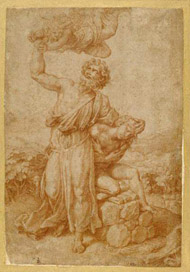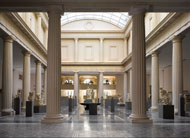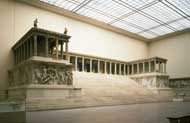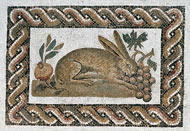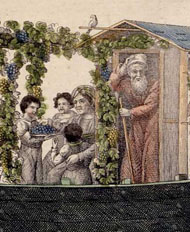
Getty Villa, Meeting Rooms
The most fascinating and horrifying variety of sacrifice remains human sacrifice. This ritual, which started in the prehistory of Homo sapiens, is hardly practiced any longer, yet its occurrence in contemporary horror movies demonstrates the continuing fascination it holds over many people. Its religious significance may have disappeared, but its emotional power still grips us and makes us shiver. |
|
From Isaac to Iphigenia: Human Sacrifice in Antiquity (public lecture)
Thursday, May 17, 8:00 p.m.
Getty Villa, Auditorium
Classical art and mythology are filled with images and stories of human sacrifice. Are these stories merely legends, or is there evidence that such episodes reflect actual ritual practices? Sarah Morris, a classicist and archaeologist at the University of California, Los Angeles, explores the visual, historical, and archaeological evidence for the offering of human victims in ancient Mediterranean cultures.
Free; a ticket is required. Call (310) 430-7300 or
get tickets online.
Getty Villa, Auditorium
|
The opening of the Met's new galleries concludes a 15-year project for the complete redesign and reinstallation of the Museum's superb collection of classical art, much of it unseen by the public for generations. Carlos A. Picón, curator in charge of the Department of Greek and Roman Art, discusses the realization of the four-phase master plan and the installation of some 5,300 works, which were previously in storage, over two levels of new gallery spaces. |
Getty Villa, Meeting Rooms
Andreas Scholl, director of antiquities for the Berlin State Museums, examines the history, function, and meaning of the Pergamon Altar against the background of Greek architecture and iconography, offering a new and surprising interpretation. |
|
Getty Villa, Auditorium
|
Aïcha Ben Abed, director of monuments and sites at the Institut National du Patrimoine, Tunisia, speaks about the collections of mosaics in Tunisian museums and about the history of mosaic conservation in North Africa.
|
Getty Center, Getty Research Institute Lecture Hall / Getty Villa, Meeting Rooms
This series exploring festivals across time and place continues on May 11 with Beate Pongratz-Leisten who speaks at the Getty Villa on ritual practices in ancient Mesopotamia. |
|
Looking Ahead
![]()
![]() Greeks on the Black Sea: Ancient Art from the Hermitage (June 14–September 3, 2007)
Greeks on the Black Sea: Ancient Art from the Hermitage (June 14–September 3, 2007)
![]()
![]() The Herculaneum Women and the Origins of Archaeology (July 12–November 5, 2007)
The Herculaneum Women and the Origins of Archaeology (July 12–November 5, 2007)
If this e-mail was forwarded to you and you would like to be added to our mailing list, subscribe to this e-newsletter now.
To change your e-mail address, unsubscribe and then resubscribe using your new e-mail address.
CONTACT US
General inquiries: villaprograms@getty.edu
Press inquiries: communications@getty.edu or visit our Press Room
THE GETTY VILLA
17985 Pacific Coast Highway
Pacific Palisades, CA 90272
(310) 440-7300
HOURS: Thurs–Mon: 10 am–5 pm. Closed Tuesdays and on January 1, July 4, Thanksgiving, and December 25. Open Wednesdays as of October 14, 2009.
The Getty Villa is an educational center and museum dedicated to the study of the arts and cultures of ancient Greece, Rome, and Etruria. Public and scholarly programs at the Villa include lectures, seminars, workshops, and symposia, and complement the interdisciplinary activities of the J. Paul Getty Museum, the Getty Research Institute, the Getty Conservation Institute, and the Getty Foundation. The permanent collections of the Museum and the Research Institute, changing exhibitions, the annual scholar research theme, conservation issues, theater productions, and research projects inspire programs for scholars, students, specialized professionals, and general audiences.
Admission to the Getty Villa is always free. An advance, timed ticket is required. Each Villa ticket allows you to bring up to three children ages 15 and under with you in one car. This does not apply to tickets for events, such as lectures and performances. Tickets are available online or by calling (310) 440-7300. Ticket availability is updated weekly for a two-month period. Same-day tickets may also become available online without advance notice. Parking is $15, but FREE for evening events after 5:00 p.m.
You are subscribed as %%emailaddr%%.
Unsubscribe here
C O P Y R I G H T © 2009 J. Paul Getty Trust | Privacy Policy
